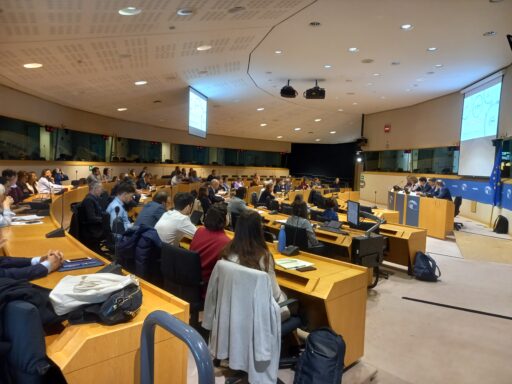June 6, 2023
CoRe SoHO calls on European lawmakers to focus on resilience and strategic role of public sector
Download
News
How to ensure sufficiency of substances of human origin (SoHO) while improving the protection and welfare of our donors? And how best to build a resilient SoHO supply system in Europe that can ensure long-term, sustainable access to patients? These were some of the questions that EBA and the three other scientific associations of the CoRe SoHO* consortium discussed in an event on the European Parliament on 23 May 2023.
The two co-hosts of the event, MEPs Nicolás González Casares (S&D, Spain) and Dolors Montserrat (EPP, Spain), highlighted the need to build resilient SoHO supply systems, on the basis of volunteer non-remunerated donations. As the future SoHO regulation makes its way through the European Parliament, MEP González Casares stressed he would like to see a stronger element of EU-wide cooperation through regular SoHO national plans and a European strategy, while MEP Montserrat focused on the need for more harmonisation on such elements as frequency of donations and approaches on SoHO sufficiency.
After introductions to the CoRe SoHO consortium, its value and position on the SoHO regulation, and the European Commission’s proposal, a first panel and discussion focussed on donation. Martin Börgel from EATCB argued that, for cadaveric donations, the donors exist but there is a need to support the current diversity of smaller establishments across all regions. While the new regulation should focus on harmonisation, supporting this local diversity is key to ensuring resilience of the supply systems at EU level. This message was also echoed by Christian Chabannon from the EBMT, who stressed that this is particularly important at a time when more commercial actors rely on the same donors. Christian also highlighted that it was important to ensure better representation of all ethnic groups in existing EU registries as well as harmonize donor follow-up, across countries and all categories of donors.
The second panel and discussion focussed on the need to improve the resilience of SoHO supply. Marjolaine Jacques from EBA, stressed the importance of having a having a broad and diverse donor base, which is the best way to improve that resilience, while stressing that examples from the US show that more paid donors stayed away during the pandemic than those moved only by altruistic motivations. Marjolaine also mentioned that the EBA-led SUPPLY project is an attempt to better understand the PDMPs supply chain and improve access to patients, on the basis of voluntary non-remunerated donations. Esteve Trias from EEBA closed the session reminding participants that resilience is based on trust and that some measures, such as investment on the protection of donation models, instead of finding savings in cheaper imports, are key to that end. On the way ahead towards more resilient SoHO supply, Esteve also mentioned the need to increase participation of scientific and professional bodies in the drafting of guidelines as well as investment on health data infrastructure, both of which are proposed by the SoHO regulation.
Concern over some proposed amendments in the European Parliament
The event took place the day after CoRe SoHO wrote to the Members of the Committee of Environment and Public Health of the European Parliament, alerting them to a number of proposed changes to the Commission’s proposal for a SoHO Regulation which, if adopted, would: undermine current safety standards for SoHO and protection of human health; diminish the role of the public and non-profit sector; introduce unacceptable uncertainty to scope of regulation; and create uncertainty to status of ECDC and EDQM guidelines. Read this letter here. A vote of these and other amendments will take place in the end of June or July.
* The Common Representation of Substance of Human Origine (CoRe SoHO) is a is a consortium of professional scientific associations formed by EBA as well as the European Association of Tissue and Cell Banks (EATCB), the European Eye Bank Association (EEBA) and the European Society for Blood and Marrow Transplantation (EBMT)

